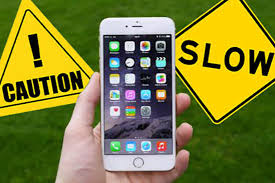iPhones are supposedly the most practical phone in the world. The technology everyone should have because everyone else has it. According to The New York Times, “Nearly 90 percent of teenagers own an iPhone.” Many choose this phone because of how popular they are, how easy they are to use, how it keeps information safe, and how they work well with other Apple devices.
After the recent IOS 17 update, many iPhones have been slowing down tremendously. Apple experts say that if this happens, one’s iPhone storage is too low to carry out the update. Common reasons why iPhones can be slow are because of too many apps running in the background, low storage, low battery, or poor network connection. According to Fixmymobile, “One potential reason for sluggishness could be due to the update consuming additional storage space leading to slower processing speeds.” Many say that after the update, they have noticed frame drops while using Safari, the keyboard is not showing up when texting on apps, and the overall screen seems very slow-moving. So many people have been trading in their phones to see if getting a new one will solve the issue.
Lexi Kline, junior, has an iPhone 15 Pro. She believes iPhones run smoother and the camera quality is better. After Kline did the recent update of the IOS 17, she noticed her phone slowing down and becoming less efficient. Kline said, Kline tried to fix this problem and no change had been made when trying to power it off or trying the given tips on Apple’s website.
Apple’s goal with these updates is to better the phone’s quality. It updates often to improve security on devices. Many people on DiscussionApple, a website where one can write reviews,come to the same conclusion. They did one of the six IOS 17 updates and their screens froze or their service went to no bars or lagging on apps and keyboards. While the update is supposed to be helpful for everyone, it is constantly lacking success. Apple has not said much about this topic but has listed steps on how to fix this issue on its website.
New IOS versions are typically more resource-intensive as they add new features. Older versions simply don’t have the same processing power to handle these demands as smoothly. Older devices also do not hold charge as well over time. Weak batteries will cause the iPhone to run slower. As more IOS updates are released and installed, less free storage is available. New IOS also takes up more storage space. Some say to prevent these, do not update the new versions even if your phone meets minimum requirements. Many prefer Iphones compared to alternative brands, even with these common issues.
Another type of phone are Androids. According to Spiceworks, androids have “compatibility issues, inconsistent user experience, and some delays in software updates.” Some pros are open sources, customization, and affordability. Many pick Androids because of a native integration with Google services and wider variety of customization then the IOS.
As many people have pointed out this problem, Apple has not said anything more on how to solve it. It’s probably best to avoid downloading updates or trading in the phone for a new or updated version of the iPhone they previously owned.









